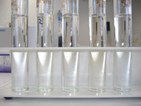Limit Testing For Heavy Metal Impurities In Organic Samples

Kingston UK - Warwick Analytical Service, the analytical division of Exeter Analytical (UK) Ltd., has developed a reputation for limit test determination of heavy metal impurities in organic samples in accordance with US Pharmacopeia 231 and European Pharmacopeia 2.4.8 Standard Methods I, II & III.

The limit test for heavy metals is a qualitative test that demonstrates that the content of metallic impurities that are coloured by sulphide ion does not exceed the limit specified in the Pharmacopeia standards. Metals that respond to this test are Lead, Mercury, Bismuth, Arsenic, Tin, Antimony, Cadmium, Silver, Copper and Molybdenum.
Offered by Warwick Analytical Service (WAS) as an analytical service, the Heavy Metals Limit Test uses one of three different sample preparation techniques described as Method I, II, or III in individual Pharmacopeia monographs. Method I is used for samples that produce a colourless solution under the test conditions. Method II is used for samples that do not yield colourless solutions. Method III involves a wet digestion and is used when neither method I nor method II is appropriate.
Operating in an ISO 17025 and GMP accredited environment, Warwick Analytical Service follows strict operating procedures whereby sample solutions are analysed against a 3-point calibration (10, 20 & 30ppm) of lead standard solution prepared the same day. A colour matching process is then used to distinguish whether the sample under the test conditions passes or fails the heavy metals limit test.
Rebekah Vine (Laboratory Manager) commented "Highly regulated companies, such as work in the pharmaceutical industry, not only are looking for testing to Pharmacopeia approved standard methods but also for a high level of compliance to QC procedures including better traceability on all data supplied". She added "The Heavy Metals Limit Test offers an inexpensive alternative to the ICP/MS Pharmacopeia method USP 730".
SOURCE: Warwick Analytical Service.
